Potřebujeme váš souhlas k využití jednotlivých dat, aby se vám mimo jiné mohly ukazovat informace týkající se vašich zájmů. Souhlas udělíte kliknutím na tlačítko „OK“.
ASTM G36-94(2013)
Standard Practice for Evaluating Stress-Corrosion-Cracking Resistance of Metals and Alloys in a Boiling Magnesium Chloride Solution
Automaticky přeložený název:
Standardní praxe pro hodnocení stresu korozi praskání Odolnost kovů a slitin ve vroucí chlorid hořečnatý řešení
NORMA vydána dne 1.5.2013
Informace o normě:
Označení normy: ASTM G36-94(2013)
Poznámka: NEPLATNÁ
Datum vydání normy: 1.5.2013
Kód zboží: NS-57658
Počet stran: 7
Přibližná hmotnost: 21 g (0.05 liber)
Země: Americká technická norma
Kategorie: Technické normy ASTM
Kategorie - podobné normy:
Anotace textu normy ASTM G36-94(2013) :
Keywords:
accelerated test, apparatus, boiling magnesium chloride, glassware, nickel containing alloy, stainless steels, stress-corrosion cracking, ICS Number Code 77.060 (Corrosion of metals)
Doplňující informace
| Significance and Use | ||||||||
|
5.1 For most applications, this environment provides an accelerated method of ranking the relative degree of stress-corrosion cracking susceptibility for stainless steels and related alloys in aqueous chloride-containing environments. Materials that normally provide acceptable resistance in hot chloride service may crack in this test. The test may not be relevant to stress-corrosion cracking in polythionic acid or caustic environments. 5.2 Resistance to stress-corrosion cracking in boiling magnesium chloride (155.0°C (311.0°F)) should, where possible, be correlated to resistance in service for the materials of interest. However, such correlations may not always be possible. 5.3 Boiling magnesium chloride may also cause pitting of many stainless alloys. This leads to the possibility of confusing stress-corrosion failures with mechanical failures induced by corrosion-reduced net cross sections. This danger is particularly great when small cross section samples, high applied stress levels, long exposure periods, stress-corrosion resistant alloys, or a combination thereof are being used. Careful examination is recommended for correct diagnosis of the cause of failure. |
||||||||
| 1. Scope | ||||||||
|
1.1 This practice describes a procedure for conducting stress-corrosion cracking tests in a boiling magnesium chloride solution. Although this test may be performed using various concentrations of magnesium chloride, this procedure covers a test solution held at a constant boiling temperature of 155.0 ± 1.0°C (311.0 ± 1.8°F). The boiling points of aqueous magnesium chloride solutions at one atmosphere pressure as a function of concentration are shown graphically in Fig. 1.2 A suggested test apparatus capable of maintaining solution concentration and temperature within the prescribed limits for extended periods of time is also described herein.3 1.2 The boiling magnesium chloride test is applicable to wrought, cast, and welded stainless steels and related alloys. It is a method for detecting the effects of composition, heat treatment, surface finish, microstructure, and stress on the susceptibility of these materials to chloride stress corrosion cracking.1.3 This practice is concerned primarily with the test solution, which may be used with a variety of stress corrosion test specimens, surface finishes, and methods of applying stress. 1.4 This standard does not
purport to address all of the safety concerns, if any, associated
with its use. It is the responsibility of the user of this standard
to establish appropriate safety and health practices and determine
the applicability of regulatory limitations prior to use.
Standard Specification for Reagent
Water Standard Practice for Preparing,
Cleaning, and Evaluating Corrosion Test Specimens (Includes all
amendments and changes 12/8/2017). Standard Terminology Relating to
Corrosion and Corrosion Testing (Withdrawn 2010) Standard Practice for Making and Using
U-Bend Stress-Corrosion Test Specimens |
Podobné normy:
Historická
1.6.2010
Historická
1.2.2011
Historická
1.4.2009
Historická
1.12.2011
Historická
1.5.2010
Historická
1.5.2010
Doporučujeme:
Aktualizace technických norem
Chcete mít jistotu, že používáte pouze platné technické normy?
Nabízíme Vám řešení, které Vám zajistí měsíční přehled o aktuálnosti norem, které používáte.
Chcete vědět více informací? Podívejte se na tuto stránku.


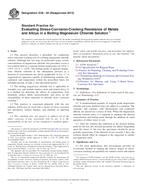
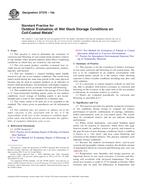 ASTM D7376-10a
ASTM D7376-10a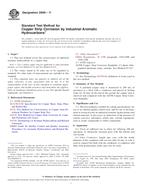 ASTM D849-11
ASTM D849-11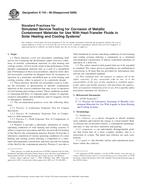 ASTM E745-80(2009)..
ASTM E745-80(2009)..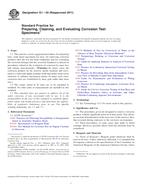 ASTM G1-03(2011)..
ASTM G1-03(2011)..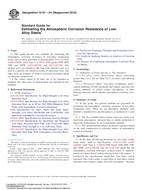 ASTM G101-04(2010)..
ASTM G101-04(2010)..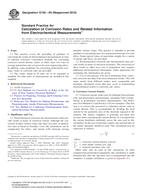 ASTM G102-89(2010)..
ASTM G102-89(2010)..
 Cookies
Cookies
